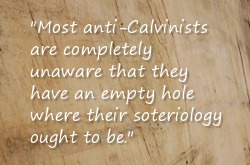Wanted: More Arminians
 It has become a bit routine:
It has become a bit routine:
- Email arrives from someone assuming I am (or everybody at SharperIron is) a Calvinist.
- Email poses question believed to be incriminating of Calvinists or unanswerable by them.
- Response from me offers biblical answer that is not especially calvinistic.
- Questioner ignores most of the particulars, broadly condemns “Calvinism.”
- Discussion becomes repetitive, overly heated or both, ends.
A recent example appears below, with details removed to avoid identifying the sender. I’m including the exchange because, this time around, a reality hit home to me that hadn’t before: apparently, many fundamentalists think that anti-Calvinism is a complete doctrine of salvation.
But anti-Calvinism is, at best, a thoughtful rejection of one particular doctrine of salvation. More commonly, it’s nothing more than a feeling of hostility toward doctrines only partially understood. As a result, many anti-Calvinists have no coherent doctrine of salvation at all. They have rejected lasagna from the menu but have walked away without ordering any alternative.
Discussion
The Electrum

Those who are beginning to study the debate between Calvinism and Arminianism tend to entertain two related but mistaken assumptions. The first is that the debate involves only two primary positions. The second is that the more extremely one implements either position, the more distant one must be from the other position. The first of these assumptions is simply untrue. The second is true, but only to a point.
Like visible light, positions in the debate between Calvinism and Arminianism form a continuous spectrum. Every Christian who has an opinion on the issues can be located somewhere along that spectrum. The issues that define the positions, however, are not necessarily those that one might expect.
Participants in this debate will be found arguing about divine sovereignty versus human freedom, about the ordo salutis, about the extent of human depravity, about the role of prevenient grace, and about whether election is unconditional, conditional, or corporate. To be sure, all of these questions are important, but they eventually lead to one critical problem. That problem is the definition of divine foreknowledge.
Divine foreknowledge is the hinge upon which all the other debates turn. One’s definition of foreknowledge will determine whether one ends on the Arminian or Calvinistic side of the debate—and everyone who expresses an opinion is on one side or the other.
Arminians see God’s foreknowledge as His foresight. God looks ahead through the corridors of time and sees what free people will choose. For Arminians, divine foreknowledge is essentially reactive.
For their part, Calvinists see God’s foreknowledge as causative. God’s foreknowledge does not passively observe the future, but rather shapes it. God’s foreknowledge makes things happen. According to Calvinists, foreknowledge is not so much God’s foresight as it is His forethought.
Discussion
"What's new is you have new people in a new time who are rediscovering the same kind of theological instincts and impulses that led to the Reformation"
Body
Mohler, Mahaney, Driscoll, DeYoung, Duncan discuss the New Calvinism.
Discussion
'Nuff Said
 Joel Carpenter is the Provost of Calvin Seminary. He is also the author of Revive Us Again, an excellent volume detailing the history of the “middle years” of fundamentalism, the period from the 1930s to the 1960s. Carpenter grew up as a fundamentalist, and he understands something about the way that fundamentalists do business. At one point in his history, Carpenter offers a long quotation from a sermon by John R. Rice.
Joel Carpenter is the Provost of Calvin Seminary. He is also the author of Revive Us Again, an excellent volume detailing the history of the “middle years” of fundamentalism, the period from the 1930s to the 1960s. Carpenter grew up as a fundamentalist, and he understands something about the way that fundamentalists do business. At one point in his history, Carpenter offers a long quotation from a sermon by John R. Rice.

Discussion